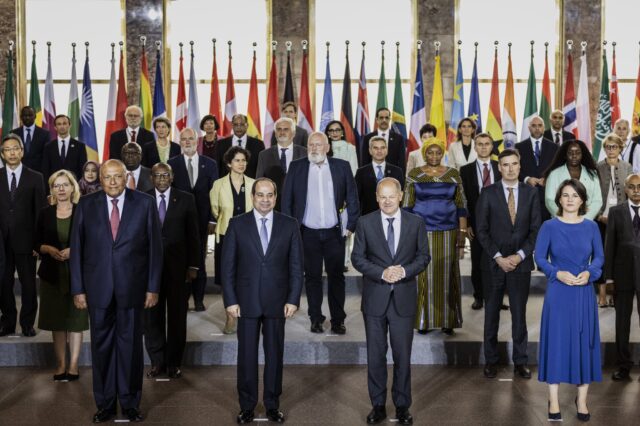The 13th Petersberg Climate Dialogue took place from 17 to 19 July in Berlin. The meeting was addressed by UN Secretary-General Antonio Guterres and government representatives from 40 countries participated in the dialogue.
The meeting discussed major climate protection agreements and focused on preparations for the COP27 World Climate Conference in Sharm El Sheikh, Egypt from the 7th to the 18th of November 2022.
The central goal of the Petersberg Climate Dialogue was to enhance trust both in multilateral climate negotiations and between the different states. Including the largest CO2 emitters such as the US, China and India, island states which are being heavily affected by it such as the Marshall Islands were also at the negotiating table. The Dialogue discussed emission reduction and adaptation. The agenda was to include a long-standing demand for financial assistance to cope with damage and losses because of climate change, in the states particularly affected by the climate crisis.
While new and intense heatwaves are affecting the world, the ongoing conflict has also contributed to the repercussions of climate change at a global level. The dialogue also decided that the fight against global warming needs a new strategy.
The 13th Petersberg Climate Dialogue also discussed how to reduce dependencies on fossil fuels and support poorer countries in switching to sustainable energy sources which will help in limiting global warming to approximately 1.5 Celsius degrees.
The UN Secretary-General Antonio Guterres warned against receding ambitions in climate protection through his video: “Greenhouse gas concentrations, sea level rise and ocean heat have broken new records. Half of humanity is in the danger zone from floods, droughts, extreme storms, and wildfires. Yet we continue to feed our fossil fuel addiction”.
It was initially decided that the countries which are industrialised were to give 100 billion US dollars annually by the year 2020 to assist climate projects in poorer countries of the Global South. However, they have missed their targets and a total of only 80 billion is expected, the final figures of which are still not available. Thus, it was decided that the 100 billion US dollars are to come annually by 2023. The recipient countries of the Global South reminded the industrialised nations about this at this edition of the Petersberg Climate Dialogue.
In his video remarks, UN Secretary-General Guterres called for stronger cooperation between the countries to battle the global climate crisis: “What troubles me most is that, in facing this global crisis, we are failing to work together as a multilateral community. Nations continue to play the blame game instead of taking responsibility for our collective future. We need to demonstrate at COP27 that a renewables revolution is under way”.
The German Foreign Ministry stated that the objective of the dialogue was to build trust in multilateral climate negotiations. The Petersberg Dialogue presented a “global protective umbrella” against climate risks at the conference. Speaking at the dialogue in Berlin on Monday, German Chancellor Olaf Scholz said: “No one can be happy with the fact that the share of coal-fired electricity generation is rising, with us as well.”
Egypt’s Foreign Minister Sameh Shoukry said that the Petersberg Dialogue was about finding “areas of agreement and possible disagreement” on climate issues. He also remarked that it is important to “keep the international climate goals alive” while “leaving no one behind.”
South Africa’s Minister of Forestry, Fisheries and the Environment, Barbara Creecy said, “Focus must be placed on the most vulnerable people and communities; To support health and well-being; food and water security; infrastructure and the built environment; as well as ecosystems and ecosystem services.”









